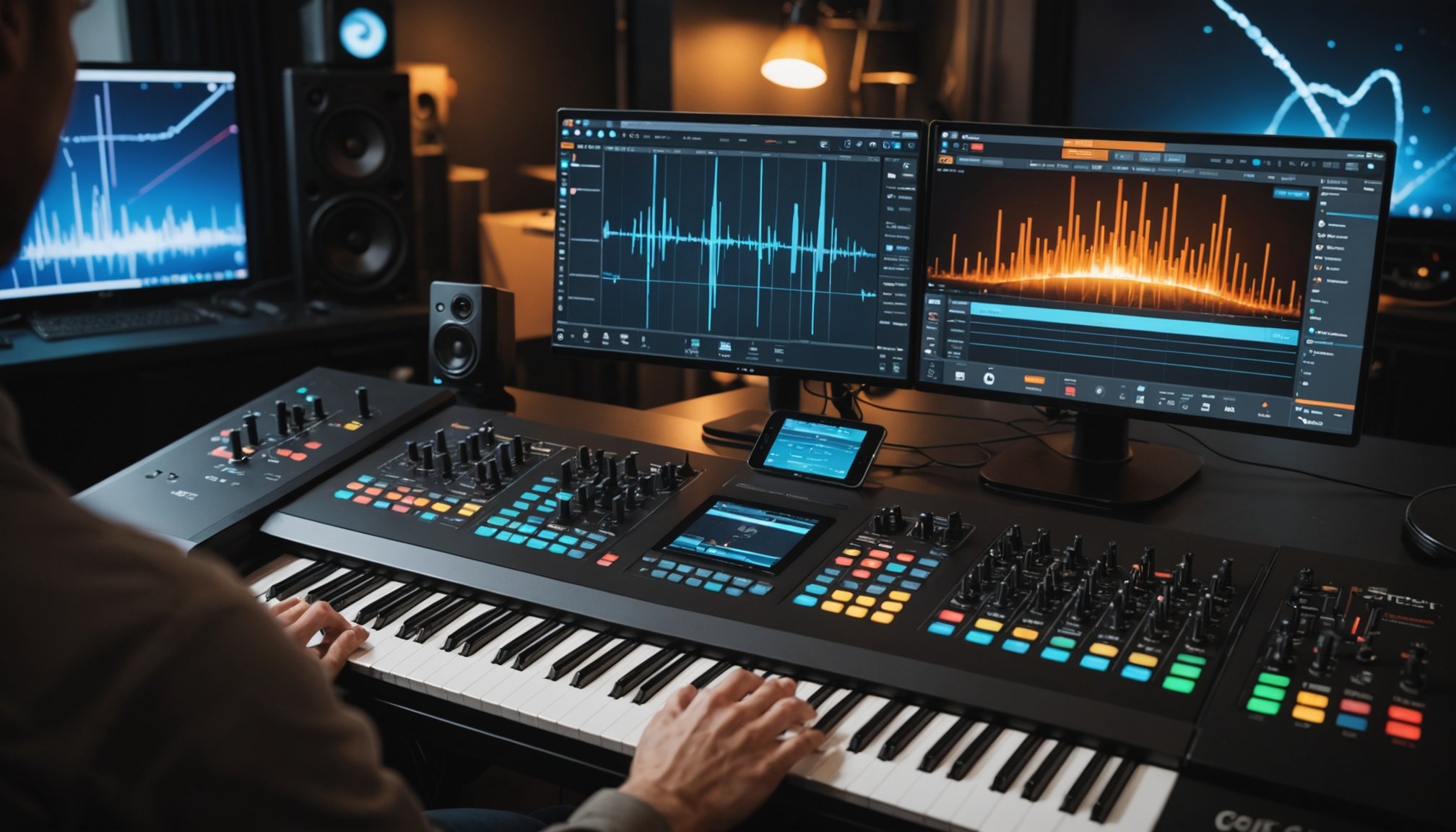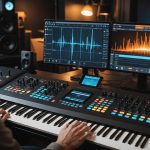Overview of AI-Generated Adaptive Music Scores
AI-generated music is transforming how we experience rhythm games. This type of music is composed using algorithms that analyze patterns and styles, allowing the creation of dynamic and personalized compositions. Adaptive music scores go a step further; they adjust music to match gameplay in real-time, altering the tempo, melody, or intensity based on in-game events or player actions. This ensures a seamless and immersive experience, keeping players engaged and enhancing their overall gaming experience.
In rhythm games, the role of adaptive music scores is crucial. These scores respond to a player’s performance, modifying musical elements to create a responsive and interactive environment. The beat can intensify if a player is performing well, or it can adapt to become more encouraging if they’re struggling. This adaptability keeps the gaming experience fresh and exciting.
Also to discover : Revolutionizing Education with Immersive VR: Key Components for Impactful Learning Experiences
AI is revolutionizing rhythm game development by providing tools to craft unique, ever-evolving soundscapes. Developers utilize AI to efficiently create and modify music, catering to diverse player preferences. By leveraging AI-generated music, rhythm games can offer tailored experiences that resonate emotionally with players, fostering a deeper connection to the gameplay. This technological integration represents a significant advancement in interactive entertainment.
Overview of AI-Generated Adaptive Music Scores
AI-generated music represents a leap forward in the creative process, where algorithms are used to compose and adapt music dynamically. This technology taps into vast music libraries and patterns, creating unique tracks that resonate with game scenarios. Adaptive music scores adjust in real-time to gameplay, ensuring that the in-game audio remains relevant to the player’s actions and choices. In rhythm games, this adaptability is crucial as it keeps players engaged and enhances the intensity and rhythm of the game flow.
Additional reading : Mastering Realistic Water Dynamics: Overcoming Challenges in Fishing Simulation Games
The role of AI in rhythm game development is transformative. By leveraging AI, developers craft music that responds dynamically to the game environment, offering a personalised experience. As players progress, the music adapts to their pace and style, creating a seamless integration between audio and visual elements. This creates an immersive auditory experience that static pre-composed tracks simply cannot match.
The fusion of AI and music in rhythm games results in an engaging and interactive musical adventure. As AI continues to evolve, its capacity to personalize and elevate gaming experiences will likely expand, setting a new standard for how game music is conceived and experienced. This forms the backbone of future innovations in gaming audio landscapes.
Benefits of AI-Generated Music for Gameplay
AI-generated music has seamlessly transformed rhythm games by providing immersive gameplay experiences. Unlike traditional scoring methods, AI music adjusts in real-time, enhancing the player’s connection to the game. This adaptability fosters deeper player engagement, capturing the nuances of gameplay better than static tracks ever could. Imagine a player navigating intense levels while the music synchronously boosts adrenaline by altering tempo and intensity. This dynamic interaction elevates the gameplay to an unparalleled level of excitement.
Moreover, adaptive experiences invigorate games by tailoring audio to match each player’s journey, maintaining a balance between challenge and enjoyment. For instance, a player experiencing difficulty may find the music becoming more supportive and encouraging, allowing for a truly personalised encounter.
A notable case study includes the game “Beat Saber,” which employs AI-generated music to adjust the player’s mood and actions ingeniously. Its success highlights the potential of AI music to redefine gaming experiences. This innovative integration not only captivates players but also opens new horizons in game design, positioning AI as a crucial component in the evolution of rhythm games. With such transformative power, AI music is set to continue reshaping how we perceive gameplay.
Comparison: Traditional Scoring vs. AI-Generated Music
Traditional scoring methods in rhythm games, while foundational, often face limitations in adaptability and dynamism. Songs are pre-composed, offering little flexibility in how music interacts with in-game actions. As gameplay intensity shifts, static tracks struggle to maintain immersion or adapt to the player’s real-time experiences. This can occasionally lead to a disconnection between gameplay pacing and musical accompaniment.
Enter AI music advantages. AI-generated compositions revolutionise game soundtracks by offering adaptable and interactive experiences. Unlike static scoring, AI music seamlessly modifies tempo, mood, and cue responses as the game progresses. This can lead to more engaging experiences by aligning closely with the player’s actions, skills, and progress.
The evolution of game music from static to dynamic scoring showcases a significant advancement. By leveraging AI, developers can move beyond traditional constraints, providing a unique musical journey each time a player engages. AI-generated music creating a responsive audio landscape enhances overall immersion and captures the emotional nuances of player interactions within the game environment, a testament to the transformative power this technology holds over conventional methods.
Future Developments in AI Music for Gaming
As the foundation of gaming continues to integrate more technology, the future of game music is set on a transformative path with AI at its core. Technological advancements suggest a horizon where AI not only composes but also evolves alongside player preferences, predicting choices and moods to enhance experiences. We anticipate further blurring of lines between player actions and musical responses, creating unparalleled immersion.
Emerging industry trends point towards AI enhancing not only rhythm games but branching out into strategic, adventure, and role-playing genres. This widespread application promises more dynamic soundscapes across varied gaming environments, enriching audio experiences universally.
However, as AI-generated music propels forward, potential challenges arise. One significant concern includes maintaining ethical considerations in content creation—ensuring that AI-generated compositions respect copyright laws and artistic authenticity. Additionally, balancing larger algorithm-driven environments with human creativity presents a continual challenge.
The road ahead highlights a world where AI-driven music transforms how players and developers perceive soundscapes. With each advancement, games inch closer to understanding and responding to unique player interactions, setting new benchmarks for sonic storytelling while navigating the complexities of technological growth.
Case Studies of AI in Rhythm Games
Exploring the impact of AI-generated music in rhythm games reveals how profoundly it has redefined gameplay experiences. Below are some exemplary games that have effectively harnessed this technology:
Game Title One
Picture a game where AI music technology seamlessly harmonises with the player’s journey. This game is a tour de force in interactive soundscapes. By intricately weaving AI-generated music into gameplay, it achieves an unmatched level of immersion and responsiveness. Player feedback highlights enhanced engagement, creating captivating experiences with every beat and rhythm change.
Game Title Two
This game showcases a ground-breaking adaptive music system that sets it apart in the gaming world. Its music dynamically shifts, offering players a unique, personalised soundtrack each time they play. Compared to traditional scoring techniques, its AI-driven approach fosters a more interactive audio-visual synergy, tailoring to the nuances of player choices.
Game Title Three
Incorporating an innovative application of AI-driven music, this game enhances overall gameplay mechanics significantly. The community response lauds the auditory experiences as transformative, noting the continual surprises AI-generated compositions bring. Future updates are eagerly anticipated, promising even more evolved musical landscapes.
Through these success stories, the potential of AI music in rhythm games becomes abundantly clear. The technology not only meets but often exceeds player expectations, forever altering how soundscapes are crafted and experienced in interactive entertainment.










